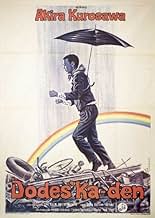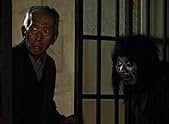Verschiedene Geschichten über die Leben der Slumbewohner Tokios, darunter ein geistig verwirrter junger Mann, der davon besessen ist, seine eigene Straßenbahn zu fahren.Verschiedene Geschichten über die Leben der Slumbewohner Tokios, darunter ein geistig verwirrter junger Mann, der davon besessen ist, seine eigene Straßenbahn zu fahren.Verschiedene Geschichten über die Leben der Slumbewohner Tokios, darunter ein geistig verwirrter junger Mann, der davon besessen ist, seine eigene Straßenbahn zu fahren.
- Für 1 Oscar nominiert
- 4 Gewinne & 1 Nominierung insgesamt
Empfohlene Bewertungen
The film doesn't have a traditional plot, it's a snapshot of the lives of a strange ensemble of characters who live in the dump. (In much of the third world today, municipal dumps are inhabited by poor people who scavenge trash to make their living. It wasn't that long ago that the same was true in the US, by the way. In the late 1800's the NYC dump was home to a population of desperate scavengers too.) Kurosawa does his usual brilliant job of creating a full spectrum of characters, except that here most of them are damaged and dysfunctional. Kurosawa is loved for his portrayals of honor, courage, and heroism. Some find it more difficult to appreciate his unblinking examination of loss, failure, wickedness and despair. This film lays bare some of the dark corners of the human heart, and presents the full spectrum of human reality, warts and all - but with an emphasis on the warts.
It's not a dark film nonetheless. These tragic blighted lives are shown with zen clarity and humor. We see a cross-section of human psychology, both good and bad, and the genius of Kurosawa makes it clear that each of us share the feelings and foibles of these Tokyo dregs.
It's too easy to give Kurosawa his laurels on the strength of the Toshiro Mifune films, his great panoramas of mist and rain, and Fuji, always, shrouded, revealed. Dodesukaden (Dodeska-Den in the US release from Janus) brings you right up into the characters, right into their faces, their homes, their hovels, their dreams. It's billed as Kurosawa's first color film. The composition is phenomenal, really. Each shot, no matter how it moves or how it doesn't, is as wonderfully framed as a painting, as balanced as a beautiful face. The color saturation is complete, and yet they seem to float above the screen rather than clobber you or intrude.
I am astounded by this film. I've never thought of Kurosawa as someone who would know how to handle squalor and the rude life of the bottom of the underclass. I was wrong. There isn't a false step in this picture, from the use of color to the editing to the choice of music and the times it's used. It's as moving a portrait of a community as I'll ever see. Dodesukaden belongs at the top of the canon of Kurosawaa's work, with Ran and The Hidden Fortress next to it.
The film is a mix of several stories, from neighbors who share the same house (and wives), to others isolated from the world and life itself.
The narrative is interesting, it's like a case study of a community that even living in the worst conditions is able to dream and be happy, and even with almost nothing they cling to it with all their strength. It was Kurosawa's first color film, where the director clearly sees himself adapting to that format.
Some scenes are a bit too long, where almost nothing goes on and evolves, which can lead to a bit of distraction by the viewers, if they are easy to get bored.
This film needs to be talked about more when someone discusses Kurosawa's filmography.
Wusstest du schon
- WissenswertesThe movie was made as the first feature of the Committee of the Four Knights, a group founded by four of Japan's greatest directors: Akira Kurosawa, Keisuke Kinoshita, Masaki Kobayashi and Kon Ichikawa. According to a interview with Ichikawa, they wanted their first picture to be a hit. When this film told a story deemed too depressing and was subsequently a failure with audiences, the group disbanded and never made another film. The movie's failure also contributed to Kurosawa's suicide attempt one year later.
- Zitate
Beggar: Our house ought to be built on a hill. We Japanese used to build houses in valleys and mountain coves. We've always preferred the lowlands.
Beggar's Son: That's true. I saw pictures of foreign countries. They have their houses in high places, but ours are in low places.
Beggar: There's a reason for that. There are many earthquakes and typhoons in Japan. Wooden houses in high places are easily shaken by earthquakes and typhoons. So they chose the lowlands to avoid the danger. But that's not the only reason.
Beggar: [continues] The Japanese prefer soft light to bright sunshine. We like shady places. We like to live in the midst of nature. So we couldn't get used to concrete houses.
Beggar's Son: That's right. I don't like concrete houses either. They're too cold for me.
Beggar: But we shouldn't forget one thing. It's true that wooden houses suit the Japanese people. But we mustn't cling to our culture and characteristics if we become weak and lose endurance as a result. By living in houses made of stone, iron, and concrete, foreigners have strengthened their characters and capabilities. Now we're building our own house. We must take our future into consideration. We must think of you, your children, and your grandchildren.
Beggar's Son: Yes, that's true.
- VerbindungenFeatured in 62nd Annual Academy Awards (1990)
Top-Auswahl
- How long is Dodes'ka-den?Powered by Alexa
Details
Box Office
- Weltweiter Bruttoertrag
- 981 $
- Laufzeit2 Stunden 20 Minuten
- Farbe
- Seitenverhältnis
- 1.37 : 1
Zu dieser Seite beitragen





























